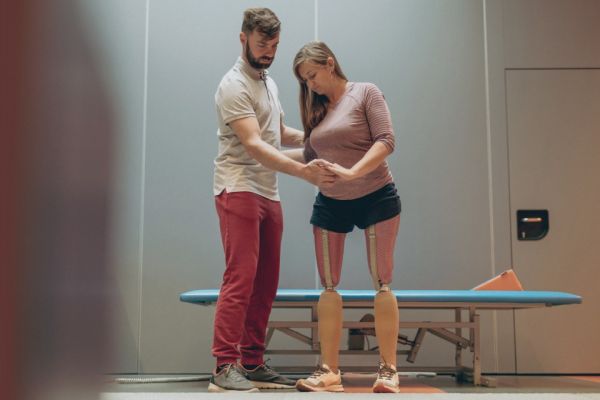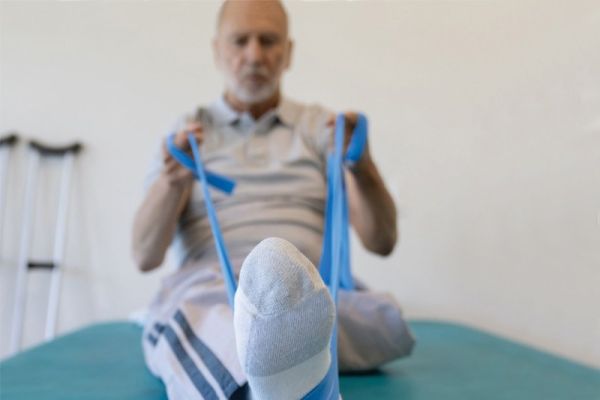Nutrition for Amputees
Author: Human Performance Resource Center

Nutrition can be a powerful ally, helping to fuel you mentally and physically for the challenges of living with an amputation. Put proper nutrition to work for you.
Nutrition can be a powerful ally, helping to fuel you mentally and physically for the challenges of living with an amputation. Make nutrition work for you by focusing on eating real foods that are high in lean protein, healthy fats, fibre, vitamins, and minerals in the right proportions. Here are some strategies to help keep you eating and performing well.
Determine Your Calorie Needs
One of the biggest adjustments you may need to make is your calorie intake. It is important to balance your need for healing with decreased activity and muscle mass. Calorie needs vary depending on where you are in the recovery process, how much activity you are doing, and your current medical issues. Calorie needs are individual, and they can vary day to day or month or month.
Schedule an appointment with a registered dietitian or ask your healthcare provider for a referral to a specialist who can help determine how many calories you need for your current medical status, your weight goal (gain, lose, or maintain), and type and intensity level of your activities.
Know your current eating habits. Keep track of what you eat for at least three days. There are many free online programs and smartphone apps that use “trackers” to assist you. You may be surprised to learn that you are under- or over-fueling your body.
Weight Gain
A common nutrition issue facing amputees is weight gain. There are many different reasons why you may gain weight after an amputation: less physical activity, depression, side effects of medication, and adjusting to a new lifestyle, including difficulty preparing and shopping for food. Weight gain increases the stress that prosthetic devices already add to your joints and can affect the fit of your prosthesis, further reducing your ability to exercise, so it’s important to take charge of your weight.
Acknowledge that you probably need fewer calories to maintain your weight than you did before your amputation. Choose smaller portions, eat snacks less, and cut back on packaged and processed foods to decrease your overall intake.
Be mindful of why you eat. Do you reach for food when you’re stressed, upset, or in pain? If so, pause and think about what else you could do: call a friend, do some deep breathing, or get some fresh air. Or try mind-body strategies, other tools, or apps to help take control of your habits.
Pay attention to portions. Even if your plate is perfectly balanced, you may be eating more than you need. Take less; you can always go back for more if you are still hungry. Pay attention to your body’s signals that you are full. And stay hydrated; you can sometimes mistake thirst for hunger.
What Should I Eat?
Nutrition is critical to maintaining a healthy weight, encouraging wound healing, decreasing your risk of chronic disease, and fueling your exercise and recovery. The types of food, combinations of food, and portions all matter. If you have difficulty consuming meals that are balanced and diverse, speak to your healthcare provider, as you may need supplements.
Eat real food. This sounds simple, but it can be difficult when you’re surrounded by convenience food, fast food, and packaged food. Choose unprocessed, whole foods most of the time.
Aim for balanced meals. My Plate (www.choosemyplate.gov) is an excellent visual food guide. Fill half your plate with fruit and vegetables, a quarter of your plate with protein from lean meats, beans/lentils, or low-fat dairy products, and a quarter with grains and starches that are high in fibre; whole grains are your best bet. Include small portions of heart-healthy fats such as those in fish, olive oil, avocado, and nuts/seeds.
Eat a good variety of foods for wound healing. Among the many nutrients that are essential for wound healing are carbohydrates, protein, and polyunsaturated fatty acids, vitamins such as C and E, and minerals, including iron and zinc. Deficiencies in any of these nutrients have been shown to delay healing. Eating a variety of foods will help you get enough of all of these vital nutrients.
Food Preparation
The thought of eating a healthy meal may sound good, but does the idea of planning, shopping, and preparing such a meal overwhelm you? The ability to prepare foods may be more difficult after an amputation due to physical barriers, limited time given to medical appointments, and decreased motivation because of depression, pain, and/or fatigue. The good news is that there are lots of ways to improve your access to healthy food.
Plan ahead. We tend to stick with healthy choices when they are easy and convenient. Plan your meals ahead of time; this way you know you have the ingredients for a healthy, balanced meal at home, and fast food won’t be so tempting. And make a grocery list before you head to the store; it helps you save time and money and curbs impulse buying.
Keep nutrient-rich foods on hand. Stock your freezer with frozen fruit, vegetables, edamame beans, and individual cuts of fish, chicken, and lean beef. Fill your pantry with canned beans, packets of tuna, nuts, seeds, peanut or almond butter, dried fruit, whole-wheat pasta, and whole grains such as brown rice, quinoa, and barley.
Cook in batches. When you, family members, or friends do cook, divide the food into individual portions you can freeze. When you’re low on time or energy to cook, just heat and eat for a quick and healthy meal. Long-term Health Issues
As mentioned above, weight gain is a common issue for amputees. Weight gain can increase your risk of infection, pressure ulcers, osteoarthritis, and cardiovascular disease. With age, amputees have increased incidences of hypertension, ischemic heart disease, and diabetes.
Start heart-healthy habits now. Ways to reduce your risk for heart disease include following a well-balanced eating plan with plenty of fruits, vegetables, whole grains, lean proteins, and healthy fats, being physically active, and staying at a healthy weight.
Focus on food. Concentrate on getting your nutrients from food first. Supplements sometimes contain unknown or unsafe ingredients that may interact with your prescription medications or otherwise cause harmful side effects. Always talk with your healthcare professional before taking supplements.
Source:
Healthy Eating for Amputees is a resource from the Human Performance Resource Center (HPRC), an online, one-stop source of evidence-based information and key resources to help soldiers and their families achieve total fitness and, ultimately, human performance optimization. Optimal performance is more than just being physically active and eating well; it’s a merger of psychological, social, familial, behavioural, nutritional, physical, and environmental fitness. HPRC is the educational arm of the U.S.’s Consortium for Health and Military Performance at the Uniformed Services University of the Health Sciences.
Determine Your Calorie Needs
One of the biggest adjustments you may need to make is your calorie intake. It is important to balance your need for healing with decreased activity and muscle mass. Calorie needs vary depending on where you are in the recovery process, how much activity you are doing, and your current medical issues. Calorie needs are individual, and they can vary day to day or month or month.
Schedule an appointment with a registered dietitian or ask your healthcare provider for a referral to a specialist who can help determine how many calories you need for your current medical status, your weight goal (gain, lose, or maintain), and type and intensity level of your activities.
Know your current eating habits. Keep track of what you eat for at least three days. There are many free online programs and smartphone apps that use “trackers” to assist you. You may be surprised to learn that you are under- or over-fueling your body.
Weight Gain
A common nutrition issue facing amputees is weight gain. There are many different reasons why you may gain weight after an amputation: less physical activity, depression, side effects of medication, and adjusting to a new lifestyle, including difficulty preparing and shopping for food. Weight gain increases the stress that prosthetic devices already add to your joints and can affect the fit of your prosthesis, further reducing your ability to exercise, so it’s important to take charge of your weight.
Acknowledge that you probably need fewer calories to maintain your weight than you did before your amputation. Choose smaller portions, eat snacks less, and cut back on packaged and processed foods to decrease your overall intake.
Be mindful of why you eat. Do you reach for food when you’re stressed, upset, or in pain? If so, pause and think about what else you could do: call a friend, do some deep breathing, or get some fresh air. Or try mind-body strategies, other tools, or apps to help take control of your habits.
Pay attention to portions. Even if your plate is perfectly balanced, you may be eating more than you need. Take less; you can always go back for more if you are still hungry. Pay attention to your body’s signals that you are full. And stay hydrated; you can sometimes mistake thirst for hunger.
What Should I Eat?
Nutrition is critical to maintaining a healthy weight, encouraging wound healing, decreasing your risk of chronic disease, and fueling your exercise and recovery. The types of food, combinations of food, and portions all matter. If you have difficulty consuming meals that are balanced and diverse, speak to your healthcare provider, as you may need supplements.
Eat real food. This sounds simple, but it can be difficult when you’re surrounded by convenience food, fast food, and packaged food. Choose unprocessed, whole foods most of the time.
Aim for balanced meals. My Plate (www.choosemyplate.gov) is an excellent visual food guide. Fill half your plate with fruit and vegetables, a quarter of your plate with protein from lean meats, beans/lentils, or low-fat dairy products, and a quarter with grains and starches that are high in fibre; whole grains are your best bet. Include small portions of heart-healthy fats such as those in fish, olive oil, avocado, and nuts/seeds.
Eat a good variety of foods for wound healing. Among the many nutrients that are essential for wound healing are carbohydrates, protein, and polyunsaturated fatty acids, vitamins such as C and E, and minerals, including iron and zinc. Deficiencies in any of these nutrients have been shown to delay healing. Eating a variety of foods will help you get enough of all of these vital nutrients.
Food Preparation
The thought of eating a healthy meal may sound good, but does the idea of planning, shopping, and preparing such a meal overwhelm you? The ability to prepare foods may be more difficult after an amputation due to physical barriers, limited time given to medical appointments, and decreased motivation because of depression, pain, and/or fatigue. The good news is that there are lots of ways to improve your access to healthy food.
Plan ahead. We tend to stick with healthy choices when they are easy and convenient. Plan your meals ahead of time; this way you know you have the ingredients for a healthy, balanced meal at home, and fast food won’t be so tempting. And make a grocery list before you head to the store; it helps you save time and money and curbs impulse buying.
Keep nutrient-rich foods on hand. Stock your freezer with frozen fruit, vegetables, edamame beans, and individual cuts of fish, chicken, and lean beef. Fill your pantry with canned beans, packets of tuna, nuts, seeds, peanut or almond butter, dried fruit, whole-wheat pasta, and whole grains such as brown rice, quinoa, and barley.
Cook in batches. When you, family members, or friends do cook, divide the food into individual portions you can freeze. When you’re low on time or energy to cook, just heat and eat for a quick and healthy meal. Long-term Health Issues
As mentioned above, weight gain is a common issue for amputees. Weight gain can increase your risk of infection, pressure ulcers, osteoarthritis, and cardiovascular disease. With age, amputees have increased incidences of hypertension, ischemic heart disease, and diabetes.
Start heart-healthy habits now. Ways to reduce your risk for heart disease include following a well-balanced eating plan with plenty of fruits, vegetables, whole grains, lean proteins, and healthy fats, being physically active, and staying at a healthy weight.
Focus on food. Concentrate on getting your nutrients from food first. Supplements sometimes contain unknown or unsafe ingredients that may interact with your prescription medications or otherwise cause harmful side effects. Always talk with your healthcare professional before taking supplements.
Source:
Healthy Eating for Amputees is a resource from the Human Performance Resource Center (HPRC), an online, one-stop source of evidence-based information and key resources to help soldiers and their families achieve total fitness and, ultimately, human performance optimization. Optimal performance is more than just being physically active and eating well; it’s a merger of psychological, social, familial, behavioural, nutritional, physical, and environmental fitness. HPRC is the educational arm of the U.S.’s Consortium for Health and Military Performance at the Uniformed Services University of the Health Sciences.











 How to resolve AdBlock issue?
How to resolve AdBlock issue?